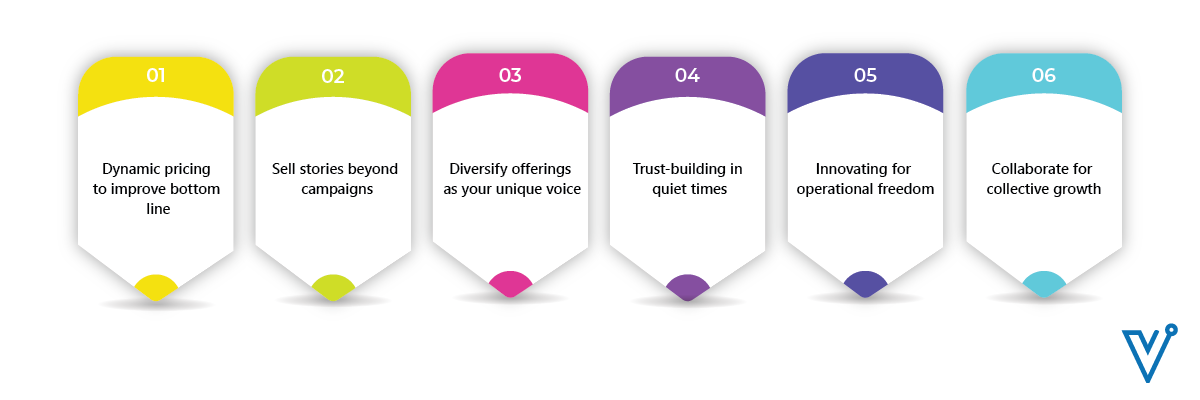Online travel agencies face seasonal fluctuations every year, which have a significant bearing on their stability and growth. Understanding economic theories that explain these cycles can be very helpful for CXOs of OTAs to manage resources throughout the year.
These theories act as strategic tools, providing a roadmap to navigate the complexities of seasonal changes in the travel industry. In this piece we will look into six critical economic theories and explain their potential applications to strategically empower OTAs to manage seasonal shifts.
Six economic theories for OTAs to manage seasonal demand fluctuations

1. Elasticity Theory: Dynamic pricing to improve bottom line
Elasticity theory, a microeconomics groundwork, explores consumer demand’s responsiveness to price changes. For OTAs, this theory becomes a tool for managing the nuances of the seasonal market. With dynamically adjusting prices based on elasticity (adjust prices based on relative demand), OTAs can optimize revenue during peak seasons without alienating cost-sensitive customers during slower periods. This approach is a nuanced application of economic principles that can significantly improve the OTA’s bottom line.
Example: Consider a hotel booking OTA that dynamically adjusts its room prices based on demand elasticity. During peak travel seasons, such as holidays or major events, the OTA could increase room prices as demand rises. Conversely, during off-peak periods, it might offer discounts or special promotions to attract cost-sensitive customers. This approach ensures that OTA optimizes revenue without losing customers during slower times.
2. Game Theory: Sell stories beyond campaigns
Game theory, originating from strategic studies, examines decision-makers’ interactions in competitive scenarios. OTAs can employ game theory to craft marketing campaigns that are strategic narratives rather than mere promotions. Tailoring marketing efforts during peak seasons and maintaining a strategic presence during off-peak times positions OTAs as adaptive players, ensuring they remain top-of-mind for travelers.
Example: Any online travel business can strategically utilize game theory in its marketing campaigns by creating engaging narratives. During peak seasons, the OTA might run a campaign that runs like a story, involving customers in a series of events or challenges related to travel. During off-peak times, it can maintain a strategic presence through interactive content and ongoing storytelling to keep customers engaged and interested in the brand.
3. Resource-Based View: Diversify offerings as your unique voice
Resource-based view theory focuses on the unique and valuable resources a firm possesses. For OTAs, this theory translates into strategic diversification. OTAs can be more visible by offering diverse travel products through exclusive partnerships or providing distinguishable travel experiences. This approach showcases resilience during slower periods by capturing the attention and loyalty of travelers seeking distinct offerings.
Example: For instance, an OTA can collaborate with local tour operators, local homestays offering curated and exclusive travel packages. This approach distinguishes the OTA from competitors and attracts travelers seeking distinct experiences.
4. Brand Equity: Trust-building in quiet times
Brand equity principles emphasize the importance of trust in consumer decision-making. Investing in building a trustworthy brand becomes a necessity for OTAs. Even in quieter seasons, the confidence built will likely translate into customer loyalty, revealing the brand’s human side that weathers seasonal fluctuations.
Example: During slower seasons, an online travel business can invest in building brand equity by emphasizing trustworthiness. It could implement transparent communication about safety measures, introduce customer satisfaction guarantees, and actively engage with customers on social media. This trust-building effort ensures that even in quiet times, customers are more likely to choose this OTA due to the established brand reputation.
5. Tech Agility: Innovating for operational freedom:
Using technology as an ally for operational agility, OTAs can integrate artificial intelligence and machine learning for real-time insights. This tech-driven agility allows OTAs to adapt proactively to changing demand patterns, bringing a human touch to operational flexibility in the face of seasonal uncertainties.
Example: Implementing AI, machine learning algorithms and other modern tech, any OTA can analyze real-time data to predict demand patterns and adjust inventory and pricing accordingly. This tech-driven approach allows the OTA to respond promptly to changing market conditions, which could be make or break in travel industry.
6. Co-opetition: Collaborate for collective growth
Co-opetition, where collaboration complements competition, becomes a strategic move for OTAs. Forming partnerships with industry peers creates a collaborative advantage. Sharing insights, resources, and strategies during peaks and valleys can strengthen the entire travel community, collectively helping OTAs sail through seasonal shifts.
Example: Online travel businesses can come together to form an industry consortium that shares market insights and collaborates on marketing strategies. During peak seasons, they might jointly promote travel packages, and during seasons, they share resources to reduce costs. This co-opetition strategy benefits the entire travel B2C travel tech community.
Incorporating these six economic theories—Elasticity Theory, Game Theory, Resource-Based View, Brand Equity, Tech Agility, and Co-opetition- into your strategic approach to managing the unpredictable seasonal demand can be extremely useful. Each theory contributes a unique perspective for OTAs to adapt and thrive in all demand cycles.








